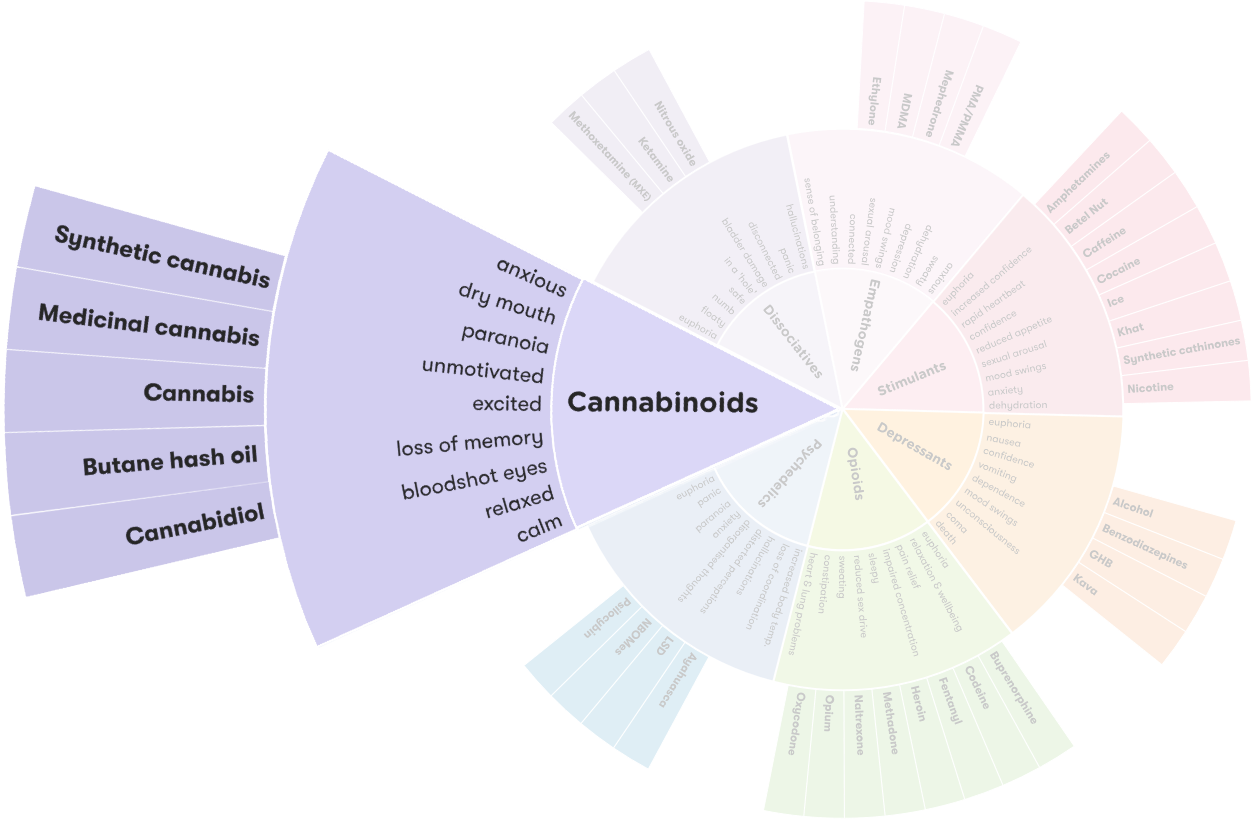What does it look like?
CBD is usually an oil but can also be infused into gummies and edibles. Other forms include:
- pills and capsules
- creams
- lotions
- ointments
- balms
- vape pens.
Other names
CBD, diet dabs
Other types of classification
Medicinal cannabis, cannabis, butane hash oil
How is it used?
CBD can be swallowed, eaten, vapourised and rubbed onto the body.
Effects of CBD
Use of any drug can have risks. It’s important to be careful when taking any type of drug.
CBD affects everyone differently, based on:
- size, weight and health
- whether the person is used to taking it
- whether other drugs are taken around the same time
- the amount taken
- the strength of the drug (varies from batch to batch)
- environment (where the drug is taken).
CBD does not provide an intoxicating effect or high.2
There’s a lack of quality scientific research into CBD; however, we know people taking CBD have reported relief from a variety of conditions, particularly pain.2
The effects of CBD might include:
- Possible pain relief: Studies suggest CBD may be helpful in reducing chronic pain and reducing inflammation,3 Sand symptoms of rheumatic diseases, such as fibromyalgia, may improve with CBD.4
- Reduced anxiety: Some symptoms of anxiety disorder have been shown to improve with CBD use.5
- Relief from cancer treatment side effects: Side effects related to cancer treatment (like vomiting and nausea) may be reduced with CBD.6
- Treatment for seizures: Seizures linked to various health conditions may be treated effectively with CBD.7-9 Epidiolex®, a prescription CBD product, has been listed on Australia’s Pharmaceutical Benefits Scheme (PBS) scheme for the treatment of seizures associated with Dravet syndrome – a severe form of epilepsy.7
- Possible improvement in sleep: CBD may help improve sleep in people with certain sleep disorders, however more research is needed.8
Common reported side effects include:
- Diarrhoea
- drowsiness and fatigue
- dry mouth
- reduced appetite.9
Long-term effects
Further research into the long-term effects of CBD is needed, but early reports indicate there’s no long-term toxicity from CBD.10
Tolerance and dependence
CBD does not seem to have dependence-related effects.
Mixing CBD with other drugs
The effects of taking CBD with other drugs − including over-the-counter or prescribed medications − can be unpredictable and dangerous.
CBD + alcohol or THC: can increase drowsiness and sedation.11
CBD + blood thinning medications ( Warfarin®): can cause higher levels of Warfarin® to be present in the body, which may cause excess bleeding and haemorrhage.12
CBD and the law
In Australia, low-dose CBD was recently changed from a Schedule 4 (prescription only) medicine to Schedule 3. This means you can access CBD products over the counter.13
Currently the Therapeutic Goods Administration (TGA) has not approved any CBD products and the process could take a number of years.13
However, a GP can write a prescription for CBD and they no longer need to apply to the TGA via the Special Access Scheme. It also means people can now access imported CBD products online or from a cannabis access clinic.13
- Fundacion Canna. What are cannabinoids? Where can cannabinoids be found? n.d. [accessed: 03.02.2022].
- VanDolah H Bauer B Mauck F. Clinicians' Guide to Cannabidiol and Hemp Oils. Mayo Clin Proc 2019;94(9).
- Darkovska-Serafimovska M ST, Arsova-Sarafinovska Z, Stefanoski S, Keskovski Z, Balkanov T, . Pharmacotherapeutic considerations for use of cannabinoids to relieve pain in patients with malignant diseases. Journal of Pain Research. 2018;11:837–42.
- Boehnke K GJ, Matallana L, Williams D,. Cannabidiol Use for Fibromyalgia: Prevalence of Use and Perceptions of Effectiveness in a Large Online Survey. The Journal of Pain 2021;22(5).
- Linares I ZA, Pereira L, Queiroz R, Mechoulam R, Guimaraes F, Crippa J,. Cannabidiol presents an inverted U-shaped dose-response curve in a simulated public speaking test. Brazilian Journal of Psychiatry. 2019;41(1):9-14.
- Sawtelle L Holle L. Use of Cannabis and Cannabinoids in Patients With Cancer. The Annals of Pharmacotherapy. 2021;55(7).
- Historic PBS listing for Australians with a rare epilepsy condition [press release]. 2021.
- Kaul M ZP, Sahni A, . Effects of Cannabinoids on Sleep and their Therapeutic Potential for Sleep Disorders. Neurotherapeutics: the Journal of the American Society for Experimental NeuroTherapeutics. 2021;18(1).
- Bauer B. What are the benefits of CBD — and is it safe to use?[accessed: 03.02.2022].
- Iffland K Grotenhermen F. An Update on Safety and Side Effects of Cannabidiol: A Review of Clinical Data and Relevant Animal Studies. Cannabis and Cannabinoid Research. 2017;2.1.
- Minerbi A, Häuser, W. & Fitzcharles M,. Medical Cannabis for Older Patients. Drugs & Aging. 2019;36:39-51.
- Grayson L VB, Nichol K, Szaflarski J,. An interaction between warfarin and cannabidiol, a case report. Epilepsy and Behaviour Case Reports 2017.
- Australian Government Theraputic Goods Administration. Over-the-counter access to low dose cannabidiol2020 22.06.2021].

